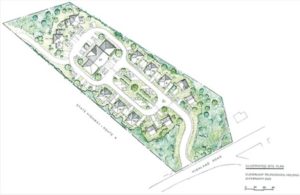TRURO — After more than a year of hearings, on Jan. 14, the Cloverleaf — which will give Truro 39 units of mostly affordable rental housing at 22 Highland Road — received unanimous approval from the zoning board of appeals.
The decision caps a year of sometimes acrimonious disagreement, confusion, and misinformation spread among neighbors by advocates including Docs for Truro Safe Water (a group of advanced-degree holders who are not hydrogeologists).
It’s unknown if a group of residents calling themselves the Pond Village Watershed Community will appeal the decision. Their attorney, Jason “Jay” Talerman of Mead, Talerman and Costa in Millis, said his clients “are pretty disappointed” but have not yet called for an appeal. They have 20 days from Jan. 14 to appeal the ZBA’s decision.

They had wanted a hydrogeologic study to see where wastewater leaving the Cloverleaf housing would go. And they wanted a back-up system to be in place in case the planned BioMicrobics BioBarrier wastewater system failed.
Though the approval ended a year of suspense for developer Ted Malone of Community Housing Resource Inc., Malone remained on guard after the vote.
“It has been a long process,” Malone said. “I appreciate the diligence of ZBA members, chairman, and town staff. And I am hopeful that the final comments of Pond Village community attorney Jay Talerman are an indication that there won’t be an appeal of the decision.”
Art Hultin, the zoning board’s chair, struck a similarly wary tone.
“We can only hope there is smooth sailing for the applicant,” Hultin said.
The Pond Village group includes about 75 people, many with addresses on Bay View Drive, Pond Road, and Twine Field Road. If they do decide to appeal the ruling, they must first prove in court that they have “standing.” Owners of property within 300 feet of a proposed project have an automatic right to appeal; those beyond that distance must show that they face potential harm from the development, Talerman said.
In this case, Talerman said, the ZBA members have acknowledged the already existing poor water quality in the Pond Village neighborhood, which he believes could give his clients standing.
Wastewater is what opponents of the project say they are worried about. Some Pond Road properties have wells with low water quality, most likely created by the existence of malfunctioning septic systems and cesspools in the low-lying village. Its residents argue that the area is vulnerable. Some have proposed that the town provide the neighborhood with a municipal water system.
An independent review of the Cloverleaf wastewater system by Horsley Witten Group engineer Mark Nelson found that the system planned for the development can remove nitrogen from the wastewater to a very low level — 5 milligrams per liter (5 mg/L). A traditional Title 5 septic system treats effluent to a concentration of 35 mg/L, according to Brian Baumgaertel, director of the Mass. Alternative Septic System Test Center in Mashpee.
A series of conditions regarding monitoring the system are included in the ZBA’s approval. If the treated effluent should exceed 10 mg/L, Malone would have one week to notify the board of health, and then get the system fixed, said Darrell Shedd of the ZBA.
To answer the neighbors’ call for stricter review of the water quality leaving the site, the developer agreed to install a third monitoring well.
Given all the work on the wastewater system, Fred Todd of the ZBA said, “We’ve come a tremendous distance … I feel really confident it will perform and I feel very supportive of it.”
All but six of the 39 Cloverleaf units will be rented to people at restricted income levels. Those income limits were left somewhat flexible in the ZBA’s approved comprehensive permit so that Malone can work with funding sources at the state level. There will be 20 units available to people earning up to 80 percent of area median income (AMI), and eight units for people earning up to 120 percent of AMI. Five were not assigned an income eligibility level pending funding requirements; six units will be rented at market rate.
The Cloverleaf would be the largest affordable housing development in Truro. Its path so far has been rocky, and the surrounding controversies will have lasting effects. For one, Peter Herridge, a member of the planning board, was censured by the select board in November for deceitful and abusive language, including calling the project developer “a little scumbag.” Herridge agreed to stop talking about the Cloverleaf as a member of the planning board, but he defended his vulgar outbursts and lies on his desire to “preserve Truro from overdevelopment.”
The select board voted Jan. 12 to place an article on the annual town meeting warrant to pursue an engineering study to investigate the cost of giving residents of Pond Road and Twine Field Road access to the public water supply that is shared by Provincetown and North Truro. The estimated cost of the study is $77,670.



